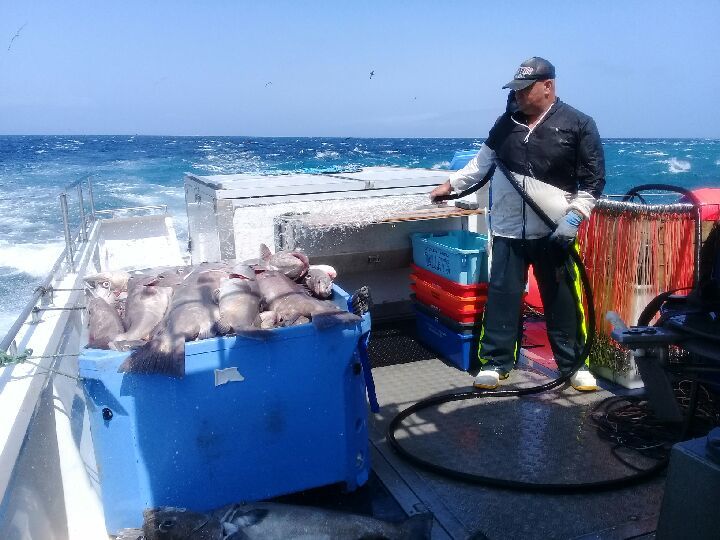Can't see the place you're looking for?
North Island:
South Island:
Thames:
Tairua:

Slow Fish Movement
Posted by —
eatnewzealand
Published —
10.10.2020
Slow fish is all about the connection between the consumer and the producer, where interest in where and how seafood is caught is paramount. When asked about slow fish, Troy Smith had no idea he fitted into the category quite so perfectly, where his niche method of line fishing has a story worth talking about. Sustainability sits at the forefront of his objectives, while surviving the ever changing industry legislations seems only just possible.
“Line fishing is actually a basic method that dates back hundreds of years” says Troy, “but we have just adapted the way we do it to suit the Cook Straight environment”. Strong tides channelling through the 16.5 mile straight make for unique conditions, but with the right knowledge, what is there can be caught.
“Pukka (grouper) and bass are my main target species… using the Dutch dan line fishing method, we are able to achieve a 95% success catch of our target, with only a minimal 5% by catch, which I can successfully cover with quota.”
Sustainability is always on the mind of fisherman Troy. Line fishing has minimal impact on the environment, and unlike many other fishing methods such as trawling and set netting, catching solely target species is highly achievable. With the right knowledge and experience, Troy claims “a 40-hook line drop can catch as many fish as a mile-long drop if you do it right, and the feeling afterwards is wonderful.”
In June 2020, Troy opened up his own seafood shop in Spring Creek, ‘The Pukka Store,’ where he sells his fresh fish from the day’s catch. Since opening, he has noticed that “people really care about where their fish comes from and they want to support the suppliers who have a positive attitude towards the industry”. Troy takes pride in providing the best product in the district; natural, fresh and cared for from boat to plate.
“I fished on the Friday, landed 45 grouper that were kept in an overnight in a slurry, then next thing I knew, at 6:30am, it was walking down the road in a customer’s hand. It doesn’t get much fresher than that.”
Troy has also recently been making sales to local restaurants, where he supplies chefs with a product they can easily work with – its fresh, clean, attractive and presents very well. “There’s nothing that comes in to the factory that we couldn’t bite straight in to!” Troy laughs. “We treat it like it’s a piece of food. It’s not thrown around or bruised and we always remember it is somebody’s dinner.”
Alongside Pukka and Bass, Troy holds quota for school shark which he exclaims is a brilliant fish that he surprisingly struggles to find a market for in New Zealand.
“School shark is fabulous. It’s probably one of the best deep-frying fish… It holds together well, crisps up nicely and handles high temperatures unlike a lot of other fish… and its very affordable!” While these conditions are ideal for a fish and chip store, Troy also enlightens us on multiple other ways to use school shark in our own kitchens. “Pan-fried, crumbed, baked and making fish pies. I’ve done all kinds of things with it!” He encourages consumers to research the real nutritional value of school shark and think twice about the negative stigma the media takes on school shark cruelty. “None of its true. It’s a fabulous nutritional product and it should be treated that way.”
Like many fishermen, Troy feels a constant battle against the media, slamming for related issues of overfishing and dumping. “The media can claim whatever they want – whether it’s true or false and we just have to cop it. Fishing is an easy beat up and within a couple of sentences, they can paint a really dirty picture. The large majority of us are really trying to do the right thing; caring for the ocean like our own back yard because what we do today will affect what we catch tomorrow and so on.”
Fishing should be focused on with a positive eye, where fishermen’s huge physical effort and constant adaptations to improve fishing methods should be celebrated.
“A lot of us shy away from the media because we are nervous to be scolded. We just want to go fishing and do what we love while caring for the ocean.” Troy hopes the media can alter their approach to focusing on those who are leading by example, and build a greater community who support fishing in New Zealand, after all – the ocean is our back yard in this great country and each of us hold the responsibility to care for it with true respect.
Words by Kaitaki Collective members Ash Reader & Zali Thomas – passionate Crayfishers from Clarence, Kaikoura - @karakalobster

